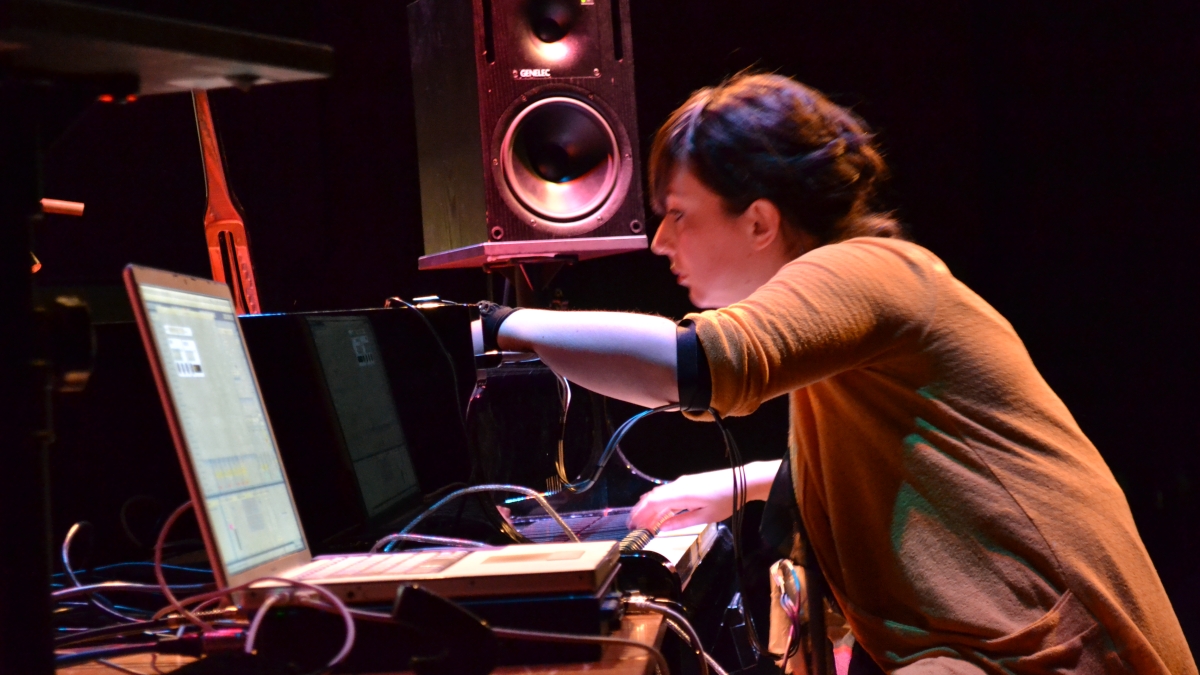ASU assistant professor to share digital music research at Loop 2017

Lauren Hayes, assistant professor in the ASU School of Arts, Media and Engineering, will present her research on education for digital music and haptic technologies at Ableton’s Loop 2017 conference.
Lauren Hayes takes the idea of “feeling the music” to a literal level. Hayes, assistant professor in Arizona State University's School of Arts, Media and Engineering, a transdisciplinary unit formed between the Herberger Institute for Design and the Arts and the Ira A. Fulton Schools of Engineering, works with haptic technology, or touch-based technology. Haptic feedback allows composers and performers like Hayes to deeply understand new and self-built digital instruments and to know how the music actually feels, which influences the musical outcomes both in composing and in the live performance.
But Hayes is more than a composer and performer. She also sees the benefits of researching haptics and of expanding education in electronic music.
“My current research in this area involves a Herberger Institute-funded research project in collaboration with ASU Speech and Hearing Science examining the benefits of using haptic feedback for music perception in cochlear implant users,” Hayes said.
Throughout her career she has given multisensory workshops that use vibration and music to explore the links between sound and touch. These workshops included working with several groups, from those with sensory impairment to students with learning difficulties to people with autism.
Earlier this year she spoke with Cycling ’74, a company that creates software for artists, about a large-scale project she worked on called Sound, Electronics and Music. The project provided education on various topics related to sound and music technology to around 900 school children in Scotland.
“A particular emphasis was placed on providing a form of music education that would engender creative practice that was available to all, regardless of both musical ability and background,” Hayes said in the interview. “The findings and outcomes of the project suggest that we should not be restricting the discussion of how to continue to educate future generations in the practices surrounding computer music to the university level. We may be failing to engage an age group that is growing readily familiar with the skills and vocabulary surrounding new technologies.”
Hayes hopes expanding electronic music education will bring more people to the art form. Her research on this project won her the Best Paper Award at the International Computer Music Conference in 2016.
“If we do the hard work surrounding how we present and teach music technology, and to whom, we might have a much richer diversity of people making electronic music, which, of course, can only lead to better art and better music,” she said.
In November, Hayes will present her research on education for digital music and her research on haptic technologies at Ableton’s Loop 2017, a three-day summit for music makers to exchange ideas at the cutting edge of music, technology and creative practice. Digital culture students in the School of Arts, Media and Engineering use Ableton's Live software tool, which allows electronic musicians to easily take their work out into the world and onto the stage.
“I'm particularly excited by Ableton's approach to diversity within its programming, sensitively curated with a 'Don't say: Do!' approach,” Hayes said. “Looking at the other participants it's a hugely inspiring collection of musicians, technologists and educators working at the forefront of creative music technology, with whom I hope to exchange ideas and foster new collaborations.”
More Science and technology

Indigenous geneticists build unprecedented research community at ASU
When Krystal Tsosie (Diné) was an undergraduate at Arizona State University, there were no Indigenous faculty she could look to…

Pioneering professor of cultural evolution pens essays for leading academic journals
When Robert Boyd wrote his 1985 book “Culture and the Evolutionary Process,” cultural evolution was not considered a true…

Lucy's lasting legacy: Donald Johanson reflects on the discovery of a lifetime
Fifty years ago, in the dusty hills of Hadar, Ethiopia, a young paleoanthropologist, Donald Johanson, discovered what would…